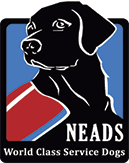What Does a World Class Service Dog Cost? Part Two: 8 Weeks to Heading Home
September 9, 2022
Let’s take a closer look at what makes up the investment—2 years and $45,000—that NEADS makes in every World Class Service Dog. In part one, we talked about what it costs to breed, whelp, and raise a puppy until they leave the nursery. Now let’s talk about the rest of that investment: from 8 weeks to the special day a new Service or Assistance Dog goes home with its partner.
While still in the Breeding Center, they begin to attend what you might think of as puppy kindergarten. Here, pups get lots and lots of socialization and the beginning of the all-important potty training. In an environment rich in objects for them to explore—we have an awful lot of toddler toys, which are just as developmentally valuable to puppies as they are to human toddlers—as well as sounds, textures, and experiences. A puppy might walk over a grate or tackle the stairs, listen to a tambourine or noisy fan, watch traffic, and play one-one-one with nursery staff and volunteers. Puppies learn that new things aren’t scary, humans are awesome, and it’s exciting to explore.
Our 8-week-old puppy is now vaccinated and ready to move on.
And the training gets more serious. The Service Dog in Training will follow one of two paths. Some puppies will go to live with an inmate handler in one of six prisons in Massachusetts and Rhode Island. On Saturdays and Sundays, the dog goes home with a volunteer Weekend Puppy Raiser, who introduces it to family life along with everything from trips to the grocery store to travel on the T. Other dogs in training will live with a volunteer Full-Time Puppy Raiser, where they work on good manners, basic obedience, and critical socialization.
Whether in prison or a private home, the puppy and handler will get frequent training and follow-up from the NEADS Trainers and Raiser Instructors. Our Trainers are on the road most days, conducting classes in the prisons with the inmate handlers. Puppy Raiser Instructors are in constant contact with the Full-Time Puppy Raisers and Weekend Puppy Raisers. The Training and Instructor teams keep detailed records on every dog, meeting frequently to discuss each dog’s progress and possible future placement.
During training, NEADS provides all the food and equipment, and many treats and toys our dogs need. That’s a lot of food, a lot of training vests, leashes, and Gentle Leaders, and a lot of the things you trip over in your living room if you’ve got a dog! While much of our dogs’ food is generously donated by Blue Buffalo, we do purchase some as well. Dog treats are a vital part of the training process, of course, as we use food and high value treats as the primary reward to reinforce good behavior. We go through an extraordinary amount of peanut butter, for example—a toy lightly filled with peanut butter is a daily treat for our dogs, as well as an aid during grooming and vet checkups. And (hot tip) did you know that a little bit of Cheese Wiz is an easy way to give a dog a pill? It all adds up.
Veterinary care is an important part of our young dogs’ lives. Our Medical Team works closely with the Trainers and Instructors as well as veterinarians (many of whom are volunteers) to ensure the dogs receive any care they need whether on our campus, in the Prison PUP Program, or living with a Full-time Puppy Raiser. In addition to routine checkups and vaccinations and the minor illnesses that arise, our dogs are carefully screened for genetic health problems, allergies, heart and joint conditions, and any other health issue that might preclude them from a career as a working dog. All Service and Assistance Dogs are neutered or spayed before placement. If you’ve had a pet, you can imagine how big an expense medical care can be.
At any one time, there will be between 80 to 100 dogs in the training program. Caring for all these dogs during their 15 to 18 months of training and supporting the Trainers, Instructors, and Medical Team requires a great deal of infrastructure and additional staff. The Hawkins Canine Center (HCC) staff cares for dogs who come for checkups, vaccinations, and grooming, as well as those who live at the HCC during their final training. The Client Services team interviews and works with our accepted clients and is instrumental in helping match them with just the right dogs. And, of course, there are those of us who don’t deal directly with dogs, but run the database, raise the funds, run the buildings, and even write the newsletters.
It’s hard to express how extremely grateful everyone at NEADS is for donors like you. NEADS makes a major investment in every World Class Service Dog, and we do it without charging a fee—we rely on donors who share our passion for these extraordinary dogs and our vision for transforming the lives of people with disabilities. Thank you for making our work possible.

